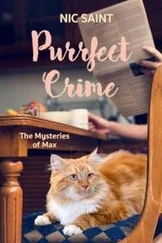Peter Abrahams - A Perfect Crime
Здесь есть возможность читать онлайн «Peter Abrahams - A Perfect Crime» весь текст электронной книги совершенно бесплатно (целиком полную версию без сокращений). В некоторых случаях можно слушать аудио, скачать через торрент в формате fb2 и присутствует краткое содержание. Жанр: Триллер, на английском языке. Описание произведения, (предисловие) а так же отзывы посетителей доступны на портале библиотеки ЛибКат.
- Название:A Perfect Crime
- Автор:
- Жанр:
- Год:неизвестен
- ISBN:нет данных
- Рейтинг книги:4 / 5. Голосов: 1
-
Избранное:Добавить в избранное
- Отзывы:
-
Ваша оценка:
- 80
- 1
- 2
- 3
- 4
- 5
A Perfect Crime: краткое содержание, описание и аннотация
Предлагаем к чтению аннотацию, описание, краткое содержание или предисловие (зависит от того, что написал сам автор книги «A Perfect Crime»). Если вы не нашли необходимую информацию о книге — напишите в комментариях, мы постараемся отыскать её.
A Perfect Crime — читать онлайн бесплатно полную книгу (весь текст) целиком
Ниже представлен текст книги, разбитый по страницам. Система сохранения места последней прочитанной страницы, позволяет с удобством читать онлайн бесплатно книгу «A Perfect Crime», без необходимости каждый раз заново искать на чём Вы остановились. Поставьте закладку, и сможете в любой момент перейти на страницу, на которой закончили чтение.
Интервал:
Закладка:
Rustling sounds, fumbling, a grunt. And Nora:
“Francie?”
“Yup.”
“What’s wrong?”
“Tell me about divorce.”
“I’m a big believer; you know that. I believe in it more than I believe in marriage.”
“And in my case?”
“Unless I’m missing something, it’s long overdue. Stop it, Bernie.”
Nora paused for a moment, long enough for Francie to supply the missing piece. She remained silent.
“Francie?” said Nora. “Are you crying?”
“Why do you ask?”
Pause. “I’ve got a court on Tuesday, sugar, five-thirty. We’ll talk.”
Francie lay awake all night, got up at dawn. She dressed, packed her briefcase, went downstairs to Roger’s door. She knocked. No answer. She opened the door. The room was dark, except for the glow of the computer screen. Roger sat before it, his back to her.
“Roger?”
No reply. No sound but the tapping of his fingers on the keys.
“It’s time to talk about divorce.”
No reply. The tapping didn’t stop. Perhaps he bent a little closer to the screen. Francie closed the door and left.
Roger stopped typing, leaving twenty-nine across-hell, in ideal form-blank. He went upstairs, into her bedroom-their bedroom-suddenly felt dizzy, sat on the bed. As the dizziness passed, Roger noticed torn wrapping paper sticking out from underneath the bed, investigated, found a painting. He studied it for a few moments-an amateurish effort-and put it back.
Divorce: unthinkable. Loss of job, breakup of marriage, what a hideous cliche. And he’d devoted most of his adult life to Francie, was certainly responsible for that polish of hers that so impressed the Sandy Cronins of the world. Plus they’d done so much together-at that very moment, he remembered a gorgeous running top-spin lob she’d made to win a key point in the Lower Cape mixed-doubles championship ten, perhaps fifteen, years before. Those legs of hers, like a dancer’s, and she was still beautiful, in some ways more than ever, as the Sandy Cronins pointed out. The bastards envied him. Corollary: she was an object to be proud of. Perhaps they’d hit a bad patch, but didn’t every marriage? As soon as he landed a suitable job, everything would be all right. Until then, that fifty grand she brought in was essential. No, divorce was out of the question. He would be ready with an apology the moment she got home. He could swallow his pride, up to a point, even though denied his marital rights. And perhaps there’d been something wanting in his approach last night, probably due to rustiness. That, too, could be fixed.
What kind of flowers did she like? He thought of calling one of her friends to find out, but he didn’t really know her friends. Except Nora, whom he didn’t like, and Brenda. Where was Brenda? London? Paris? Rome? All easily reached by phone. He found Francie’s address book in her kitchen desk.
Brenda. Rome. He dialed the number, heard a female voice: “Questa e la segretaria telefonica di…” Roger had no Italian and wasn’t aware that he’d reached an answering machine until he heard the beep. He hung up without speaking.
Tulips? Petunias? Gladioli? Probably not gladioli-weren’t they associated with funerals? Roger’s mind leaped to another thought: what if something happened to Francie? The fifty grand would be gone, and while he had life insurance, she did not. Who was that insurance peddler-Tod? Tad?
Roger put on a suit and tie and went out to hunt for flowers. It was snowing, fluffy snow that quickly spread a thick carpet on the sidewalk. Roger’s ankles were cold; he glanced down, saw he was still in his slippers. He stepped back inside, put on his L. L. Bean boots, decided to try Brenda again. God was in the details: the flowers had to be right.
“Pronto,” said a voice, again female, but not the answering machine. He felt a change in the way his luck was running.
“Brenda?”
“Si?”
“This is Roger Cullingwood.”
“Roger?” Pause. Then: “Is Francie all right?”
“Very much so. I’m having a little dinner for her tonight, in fact.”
“I can’t possibly make it on this kind of notice, Roger.”
He laughed and heard the echo of the laugh in the line-a strange barking sound, surely distorted by the Italian phone system. “I know that. The problem is I can’t remember her favorite flower.”
“And you called me in Rome? Aren’t you sweet. Lilies, of course.”
“Lilies. Thanks very much.” He was about to say good-bye when she asked, “How’s the cottage, by the way?”
“Cottage?”
“You know-Francie looks in from time to time. I hope.”
“I wasn’t aware.”
“On the Merrimack. In it, rather.”
“In it?”
“I’ve got another call, Roger. My love to Francie.”
When Francie came home from work, there were lilies on the hall table and in the kitchen, lobsters steaming in the pot, champagne on ice. The dining room, unused for at least a year, maybe longer, was lit with candles, the table set with the Sevres that had belonged to Roger’s grandmother.
“My apologies, Francie,” said Roger. “I don’t know what got into me. I was drunk, as you said, but that’s not an excuse. I’m deeply sorry.”
Francie was speechless. She hadn’t even expected to find him upstairs.
“No need to say anything.” He sat her down, filled her glass. The scratches on his face were invisible. Francie saw he’d covered them with face powder, probably from her drawer, since it was too dark for his complexion. “Recognize this champagne?” he asked.
Laurent Perrier Rose: they’d drunk it to celebrate the end of the hiking trip he’d taken her on in the Cevennes, following the route of Robert Louis Stevenson. That had been years ago, not long before the petri-dish phase. Francie was amazed that he would remember, amazed by the candles, the lilies. It was all perfect, and unreal, like a Cary Grant movie; and pathetic, which Cary Grant never was. That-the pathetic part-and the secret fact of Ned, undermined the righteousness of her anger.
He cracked a claw. “Remember that summer, Francie?”
“Of course.” She saw that he was without a tie, almost the first time she’d seen him that way since he’d been fired.
“We had fun, didn’t we?”
“Yes.”
“You’re not eating. I didn’t overcook it, did I?”
“It’s just right.” She took one bite, could barely get it down.
“That’s better,” he said, beaming. “Here’s to France. And Italy, too, for that matter.”
They drank to France and Italy. “What’s this all about, Roger?”
“Just dinner,” he said. “No agenda. A quiet marital dinner.”
“Did you hear some news today?”
“News? What sort of news?”
“About work.”
Roger kept smiling, but his eyes no longer participated. “Everything’s going to be just fine.”
“What did you hear?”
“Nothing definite. But I’m optimistic.”
He went back to the hiking trip, bringing up details she was sure he would have forgotten: the shepherd with the steel teeth, the one-eyed dog that had followed them for days, the blue-black cherries they’d picked off a tree, eating until they could eat no more, cherry juice dripping off their chins. All true. But what had become of that Roger, and how responsible was she? Too late to go back-or even think about it-but would there be dinners like this in some future with Ned, candlelight in his eyes, melted butter on his fingers, time?
“And now for dessert,” Roger said.
“None for me.”
He came in with a pecan pie, her favorite. “Just try it,” he said.
Again one bite. Had she ever tasted better? But still she could hardly swallow.
“I went heavy on the butter and added a little maple syrup,” Roger said.
Читать дальшеИнтервал:
Закладка:
Похожие книги на «A Perfect Crime»
Представляем Вашему вниманию похожие книги на «A Perfect Crime» списком для выбора. Мы отобрали схожую по названию и смыслу литературу в надежде предоставить читателям больше вариантов отыскать новые, интересные, ещё непрочитанные произведения.
Обсуждение, отзывы о книге «A Perfect Crime» и просто собственные мнения читателей. Оставьте ваши комментарии, напишите, что Вы думаете о произведении, его смысле или главных героях. Укажите что конкретно понравилось, а что нет, и почему Вы так считаете.












